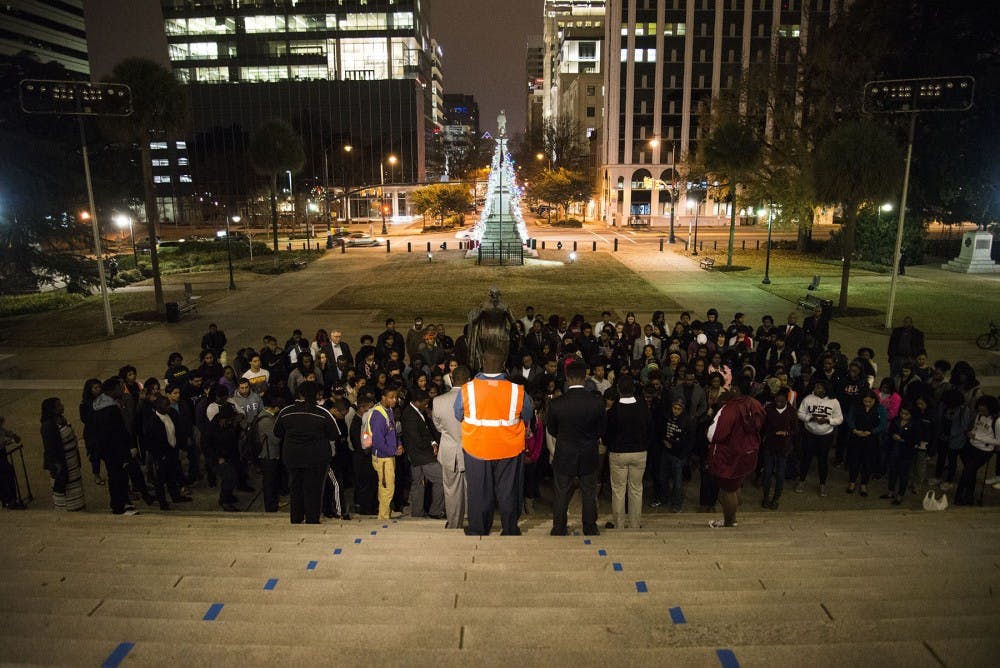About 200 students — black, white, male, female — marched from Greene Street to the State House in a line that stretched a city block on Tuesday night. They started in complete silence, but as they drew closer, they began their simple, four-word chant: “Hands up, don’t shoot.”
They were protesting the recent events in Ferguson, Missouri, in which Michael Brown, a black man, was killed by a white police officer. An interest group composed of members of between 30 and 40 student organizations organized the march, which followed a forum on the incident.
When the group reached their destination on the Statehouse steps, they listened to poems, read names of black people killed by police since summer 2014 and had a four and a half minute silence for the four and a half hours Brown laid dead in the street.
Every member of the march was given a small rock, which was used as a symbol for black individuals who have been killed by police officers.
“Every person here has a rock, and every rock is made up of atoms. The countless number of atoms in each and every rock represent the bodies, the black bodies, that are being killed for no other reason than their skin,” said Karli Wells, one of the event organizers. “We represent the genocide that’s taking place in our country.”
But among the crowd, there was one element that stuck out from its surroundings — the Confederate flag waving in front of the State House behind the protestors.
“It’s a symbol of all of these things wrong in our country, in our state, at USC,” Wells said. “We have a responsibility to make a difference and to be that change.”
Jon McClary simply pointed behind him to the 200 students that had come out, when asked if he thought the forum and protest had been successful, event organizer and third-year public health student.
“We have reached and pulled so many areas of campus that it was bound to be successful,” he said. “I think it’s a good stepping point in the right direction and shows that people are really excited about change.”
The protest ended with Courtland Thomas, another organizer of the event, encouraging the protestors to use the pain they were experiencing positively.
“Tonight we should leave here determined, educated, aware, empowered,” Thomas said. “It’s up to us to turn the pain that we’re feeling from all the lives that have been lost, turn that pain into promise for the future.”
McClary echoed the same sentiment, saying he thought that the forum and protest had the potential to create change because it showed that USC students “aren’t just going to sit down for anything.”
“We have to keep moving, and we have to keep the fire lit because it’s so easy for movements to die out after a couple of days, after it’s not popular anymore,” McClary said. “We have to make sure this won’t happen again. I would love it one day when we don’t have to have events or things like this.”
The fuel for the protest came from the hour-long forum beforehand. The event was called "State of Emergency: The Decision."
The panel for the forum featured Jay Bender, the Freedom of Information Chair for the USC School of Journalism of Mass Communications; Lamar Fyall, an assistant solicitor in Richland County; and Carl Wells, assistant director of the Office of Equal Opportunity Programs.
They quickly started off by giving their opinions on the events that had unfolded in Ferguson.
“What do I think the cop should have done? I think the cop should have deescalated the situation from the beginning,” Bender said. “Isn’t it interesting that the majority population in Ferguson is African-American and the city council is all white?”
When faced with the statistic that 67 percent of citizens in Ferguson are black, but only three of 53 members of the police force are black, the protestors discussed the racism still present today.
“Racism isn’t something that happens exclusively to black people. It isn’t something that happens exclusively to black males. It doesn’t just happen in Ferguson,” Wells said. “It happens here as well. Yes, it’s about race, but there are also other issues interwoven.”
Bender decided to give a concrete example of racism he could see in society. He asked the audience how many of their parents had told them to keep their hands on the steering wheel if stopped on the road by a police officer, and almost half the audience raised their hands.
“We all know the most enforced traffic crime is DWB — driving while black,” Bender said. “There’s institutionalized racism right there … I think we need to train the police. I think we need to train society as well.”

